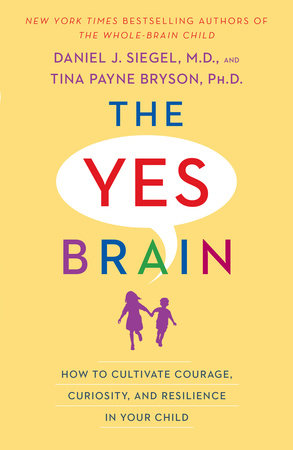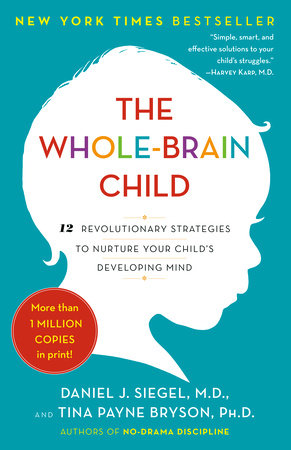How Reading with Your Children Can Help Them Develop a ‘Yes Brain’
by Daniel J. Siegel, M.D., & Tina Payne Bryson, Ph.D.
“I’m not afraid of storms, for I’m learning how to sail my ship.”
—Louisa May Alcott, Little Women
Our new book The Yes Brain opens with the above quote as its epigraph. The Alcott line is a great way to think about the job we have as parents as we seek to empower our children to sail their ships through whatever storms they face. We can give our kids experiences that help produce either a “Yes Brain” mindset that allows them to be receptive, open, curious, and creative in the face of life’s problems, or a “No Brain” mindset that leaves them reactive, shut down, rigid, and fragile.
What, specifically, do they need in order to captain their individual ships in a Yes Brain way that leads to happiness and fulfillment? What characteristics, in other words, should parents emphasize the most? As we travel the world speaking about our books The Whole-Brain Child and No-Drama Discipline, we hear some form of that question all the time. The Yes Brain is our response.
We focus on what we call the four Yes Brain fundamentals: balance, resilience, insight, and empathy. These are the qualities we all need to be successful in life, and if we can promote them in our children, they’ll be well on their way to approaching life from a Yes Brain perspective.
And a great way to promote a Yes Brain in your kids is by reading with them. Each Yes Brain fundamental emerges directly and spontaneously when you dive together into the pages of a book. Here are some quick suggestions to help you be intentional about highlighting the Yes Brain fundamentals.
Balance: Balance is all about emotional regulation. When emotions run high, it takes practice, skills, and maturity to stay calm and make thoughtful choices, even when we’re anxious, angry, or afraid. Managing our emotions and controlling our bodies is an essential part of social and emotional intelligence and having good friendships. As children see characters handle their emotions and impulses well and poorly, they can learn skills to handle emotions. As you read stories together, ask your child these questions to explore and develop balance:
- How well do you think the character handled those big feelings?
- What could the character have done differently?
- What do you do when you have big feelings like that?
- What calms you down the most when you have that big feeling?
Resilience: One of the most important things we can help develop in our kids, resilience allows us to bend without breaking when life is hard. It’s not about avoiding feeling difficult emotions or trying to escape adversity, but about tolerating and even growing from the times when things don’t go our way. Resilience keeps us from feeling victim to life circumstances or to our internal emotional distress. As you read stories together, ask your child these questions to explore and develop resilience:
- When the character faced that conflict, how did they handle it?
- Did you see how even though things were difficult/sad, it didn’t stay that way and things got better?
- What makes you strong when things are hard?
- What’s something difficult you went through that made you stronger/smarter/kinder?
Insight: As children observe the feelings and experiences of characters, they learn about themselves. They are given language that helps express what they, themselves, experience and they gain insight into their own behaviors and emotions. As you read stories together, ask your child these questions to explore and develop insight:
- Have you ever felt that way?
- What would you do in that situation?
- How would you decide?
Empathy: Studies show that reading fiction increases our capacity for empathy. As we read about the minds, experiences, and feelings of another, we feel with them. This increases our ability to understand others’ minds and internal experiences so that we can better empathize with them. The more children practice this skill, the more their brains get wired with this capacity. As you read stories together, ask your child these questions to explore and develop empathy:
- How does the character feel? What are they afraid of? What are they excited about?
- What does the character expect will happen?
- What does the character wish would happen?
No matter what book you pick up, reading together can help you raise kids with resilient minds and connected brains. Just the act of physical closeness that occurs when we pull our children close and join together to share the moments that unfold as we read together — laughing, looking at the same pictures, talking about what we wonder about, and sharing the joy that comes from wonderful books — helps create a Yes Brain.
Watch Dr. Daniel J. Siegel discuss the differences between a reactive state and a receptive state, or a Yes Brain state, in this video. Want to learn more about raising children with resilient minds and connected brains? Check out The Yes Brain, The Whole-Brain Child, and No-Drama Discipline by Daniel J. Siegel, M.D., and Tina Payne Bryson, Ph.D.



